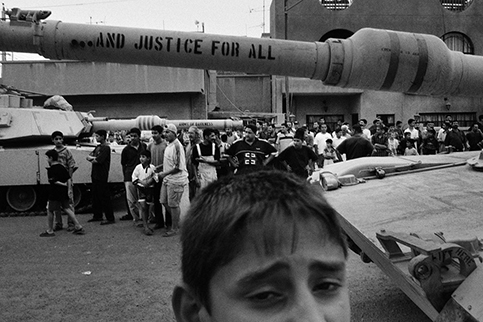
- Tadamon! Montréal statement – octobre 2014 (photo Noah Addis)
We reject the Canadian government’s decision to join a US-led bombing campaign against the Islamic State (IS) in Iraq. There is little doubt that these acts of violence will have devastating consequences for people living in the region, and will only serve to further conflict and suffering.
In early October, the Conservative government passed a motion in Parliament to go to war without even the pretense of democratic process. This decision authorizes the Canadian military to conduct air strikes for up to six months and includes the deployment of six CF-18 fighter jets, a refuelling tanker aircraft, two surveillance planes, one airlift plane, and about 600 air crew members. Canada joins the US, Great Britain, France, Australia and about a dozen other states, (including authoritarian regimes in Saudi Arabia and others parts of the Arabian/Persian Gulf) in what US President Barack Obama has declared to be “a long-term project.”
The Harper government’s cynical appeal for Canadians “to do (their) part” reflects an interventionist, neocolonial approach to Canadian foreign policy, in that it takes for granted that Canada and other Western powers necessarily have a part or should have a part. Similar to the “War on Terror”, the publicly stated justifications for this intervention are mired in racist civilizational discourse and Western saviorism, while ignoring the imperial nature of this form of global racialized military policing.
The arguments made to support Canadian involvement in bombing Iraq are both flawed and dangerous. These claims are ahistorical, removing the Islamic State from the context in which it emerged and is sustained, and serve to place blame on “ideology” or “culture” while ignoring actions on the part of outside actors.
Despite the media’s overwhelming tendency to place the blame for this war on the Salafi ideology of IS (or on the entire Islamic faith), an examination of the history of Iraq makes it obvious that Western imperial powers played a direct role in creating the context in which ISIS emerged. During the first half of the twentieth century, Iraq spent decades as a British Mandate and later “protectorate,” carved out of the “Middle East” in territorial negotiations between European powers without any regard for local politics and affiliations. This imperial history produced divisions and instabilities, rooted in arbitrary colonial borderlines, which to this day shape and inform political strategies and actions that sustain and justify conflicts in Iraq.
Over the past three decades, the United States and other Western Nations have participated in sustained political, economic and militaristic violence against the people of Iraq. During the Gulf War, the United States dropped one hundred and forty-thousand tons of munitions on Iraq, and lead economic sanctions against the country in the 1990s, which according to the United Nations, caused the deaths of more than 500,000 children. More recently, the United States led a series of countries to war in 2003, in which well over 100,000 Iraqis, mostly civilians, were killed. This history of American violence against the people of Iraq is directly connected to the emergence of IS. Fallujah, the first city to fall to IS, was devastated by radiation poisoning from depleted uranium in American munitions, which left the inhabitants of Fallujah with high cancer rates, birth defects, genetic mutations and disabilities. Clearly the roots of IS within this region of Iraq lie in the recent history of US atrocities.
Despite the current Canadian and American media consensus that the 2003 war in Iraq was a political and humanitarian failure, there is little media opposition to or even debate, surrounding this new Iraq war. Instead the media is uncritically trotting out the same Islamophobic and alarmist arguments used to drum up support for many recent imperial wars in the Middle East, such as the equally devastating war in Afghanistan.
One reason behind the media and politicians’ uncritical stance towards the new Iraq war is that air war – though as deadly to the people being bombed as a ground invasion – tends to disturb the Canadian and American press less than a ground invasion that would result in the deaths of “our” soldiers.
Furthermore, the public’s sometimes racist, reactionary and reductionist response to the brutality of IS, serves to dehumanize the people of Iraq, and justify the war in the minds of many within the halls of power in Canada.
Furthermore, the impacts of Canadian intervention have been ignored (either intentionally or otherwise). They include:
* The possibility for the bombing to extend outside of Iraq into Syria.
* The inevitability that civilians will be most impacted by this bombing campaign.
* The reality that this outside use of violence will only serve as fodder for proponents of sectarianism, further entrenching the conditions that favour Islamic State recruitment.
* The further destruction of critical social and public infrastructure in Iraq already deeply weakened by over two decades of war and sanctions.
Alongside its military allies, Canada claims the role of saviour and protector, while ignoring the fact that it was these same countries and international institutions that created the conditions for this current turmoil in Iraq and Syria. Similarly, Canadian claims to fight religious/Islamic fundamentalism in the region are cynical, as political elites in Ottawa have moved to strongly ally themselves with regimes in the region, that, themselves, draw legitimacy from strongly conservative and inflexible religious interpretation, like Saudi Arabia.
As Canadian warplanes move to drop bombs on Iraq, let us stand together to reject and oppose this unjustifiable military intervention. Underlying the current military campaign are massive profits for Canadian arms manufactures and the further entrenchment of contemporary neo-colonialism that drives contemporary conflict.
Tadamon! Montréal – octobre 2014


